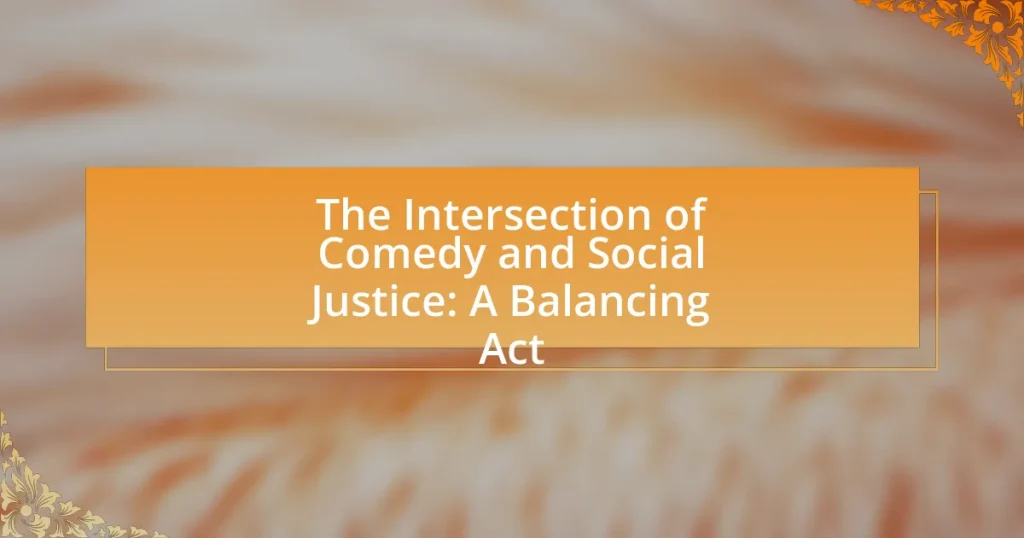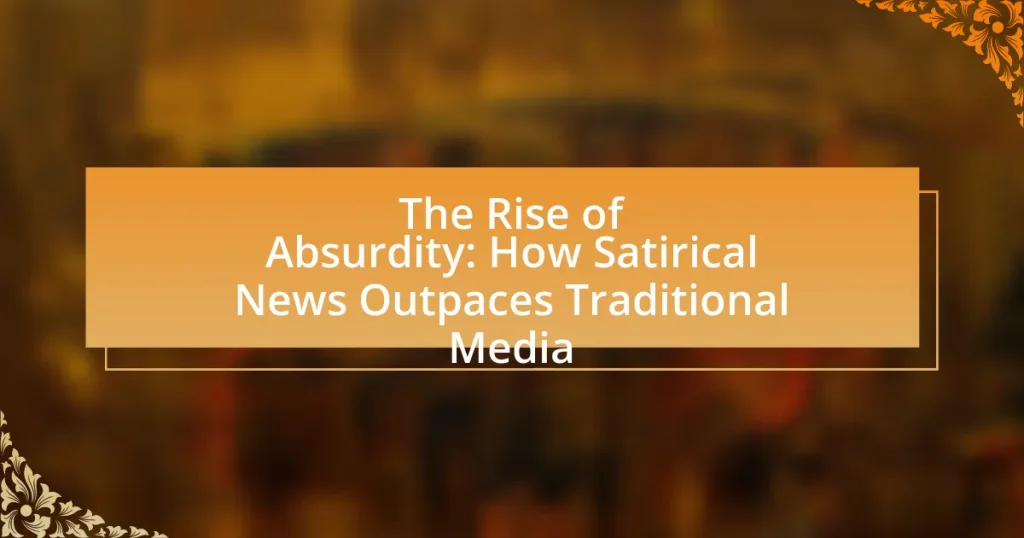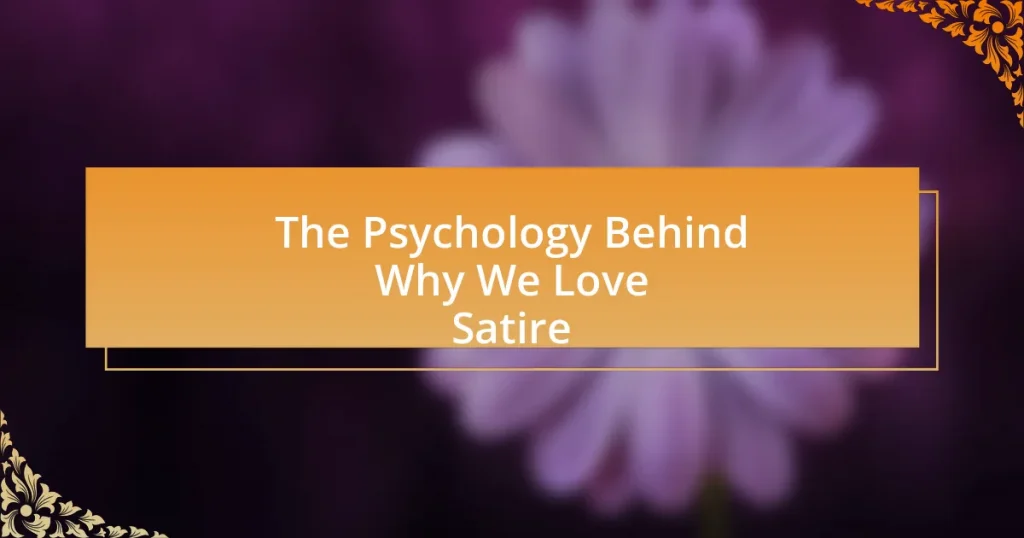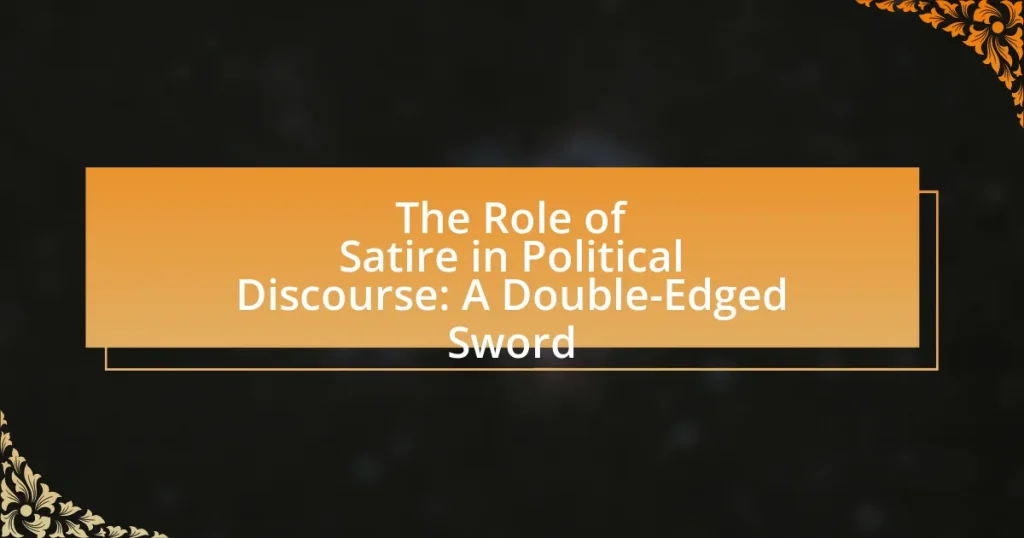The article explores the intersection of comedy and social justice, highlighting how humor can be utilized as a tool for addressing and critiquing societal issues such as race, gender, and inequality. It examines the historical contexts that have shaped this relationship, the challenges comedians face in addressing social justice, and the importance of cultural sensitivity. Additionally, the article discusses successful comedic approaches to social justice, the impact of social media, and the role of diverse voices in shaping narratives. It emphasizes the need for comedians to balance humor with respect for marginalized communities while providing practical tips and resources for effectively engaging with social justice themes.
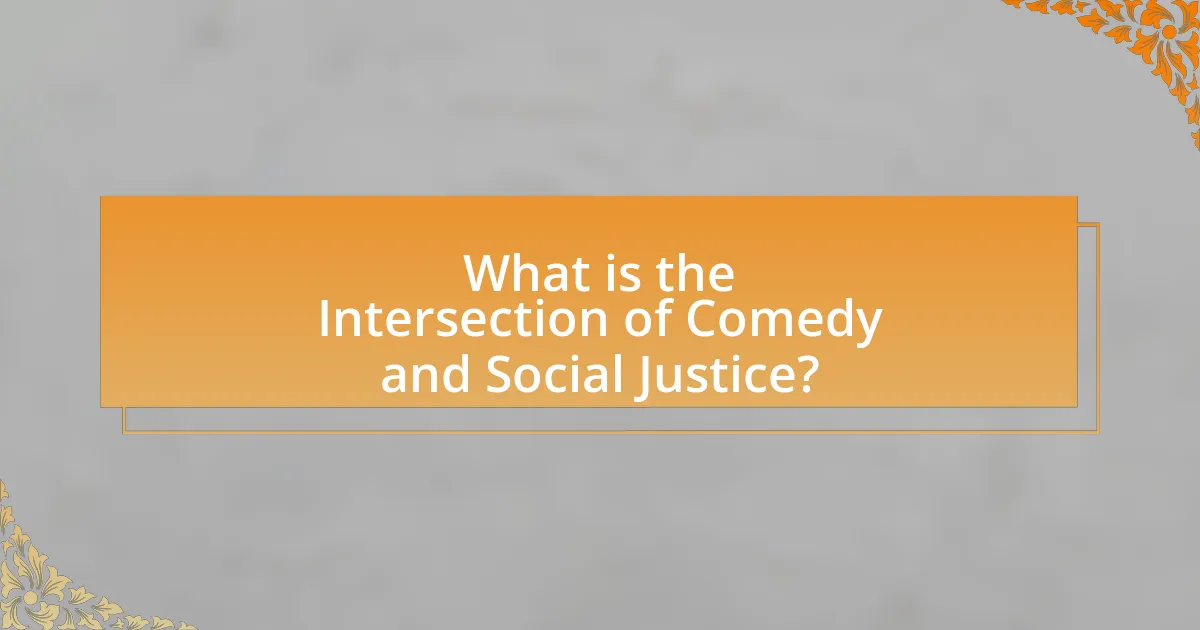
What is the Intersection of Comedy and Social Justice?
The intersection of comedy and social justice involves using humor as a tool to address and critique societal issues, promoting awareness and change. Comedians often tackle sensitive topics such as race, gender, and inequality, using satire to highlight injustices and provoke thought. For instance, comedians like Dave Chappelle and Hannah Gadsby have successfully blended humor with social commentary, sparking discussions about systemic racism and LGBTQ+ rights. Research indicates that humor can facilitate difficult conversations, making it an effective medium for social justice advocacy, as evidenced by studies showing that comedic approaches can increase empathy and understanding among audiences.
How do comedy and social justice relate to each other?
Comedy and social justice are interconnected as comedy often serves as a platform for critiquing societal norms and injustices. Comedians use humor to highlight issues such as racism, sexism, and inequality, making these topics more accessible and engaging for audiences. For instance, stand-up comedians like Dave Chappelle and Hannah Gadsby address social justice themes in their routines, prompting discussions about systemic issues. Research indicates that humor can facilitate conversations about difficult subjects, allowing audiences to reflect on their beliefs and biases. This relationship underscores the potential of comedy to challenge the status quo and advocate for social change.
What historical contexts have shaped this intersection?
The intersection of comedy and social justice has been shaped by historical contexts such as the civil rights movement, the feminist movement, and the LGBTQ+ rights movement. During the civil rights movement of the 1960s, comedians like Dick Gregory used humor to address racial inequality, highlighting social issues while entertaining audiences. The feminist movement in the 1970s saw female comedians like Joan Rivers and Lily Tomlin challenge gender norms and advocate for women’s rights through satire. Additionally, the LGBTQ+ rights movement, particularly in the 1980s and 1990s, brought forth comedians like Ellen DeGeneres and RuPaul, who used comedy to promote acceptance and visibility for LGBTQ+ individuals. These movements collectively influenced comedic narratives, allowing humor to serve as a tool for social critique and change.
How have comedians addressed social justice issues in their work?
Comedians have addressed social justice issues in their work by using humor to highlight societal inequalities and provoke thought. For instance, comedians like Dave Chappelle and Hannah Gadsby tackle topics such as race, gender identity, and mental health in their routines, often blending personal narratives with broader social critiques. Chappelle’s special “8:46” directly confronts racial injustice and police brutality, reflecting on the impact of George Floyd’s death. Similarly, Gadsby’s “Nanette” critiques misogyny and the LGBTQ+ experience, challenging audiences to reconsider their perspectives on these issues. These examples illustrate how comedy serves as a platform for raising awareness and fostering dialogue around critical social justice topics.
Why is the balance between comedy and social justice important?
The balance between comedy and social justice is important because it allows for humor to address societal issues without perpetuating harm or reinforcing stereotypes. Comedy can serve as a powerful tool for social critique, enabling audiences to confront uncomfortable truths and challenge the status quo. However, when comedy crosses the line into insensitivity or reinforces oppressive narratives, it can alienate marginalized groups and undermine social progress. For instance, research by the University of California, Berkeley, indicates that humor can effectively promote social change when it encourages empathy and understanding, rather than division. Thus, maintaining this balance is crucial for fostering inclusive dialogue and promoting a more equitable society.
What are the potential risks of crossing boundaries in comedy?
Crossing boundaries in comedy can lead to significant risks, including alienation of audiences, backlash from marginalized communities, and potential harm to social discourse. When comedians tackle sensitive subjects, they may inadvertently reinforce stereotypes or perpetuate harmful narratives, which can result in public outrage and damage to their reputation. For instance, comedians like Michael Richards faced severe backlash for racially charged remarks, illustrating how crossing boundaries can lead to career repercussions and loss of audience support. Additionally, the risk of trivializing serious issues can undermine important social justice movements, as humor may be perceived as dismissive or insensitive.
How can comedy serve as a tool for social change?
Comedy can serve as a tool for social change by highlighting societal issues and challenging the status quo through humor. Comedians often use satire to expose injustices, provoke thought, and inspire dialogue among audiences. For instance, shows like “The Daily Show” and “Saturday Night Live” have addressed political corruption and social inequality, influencing public opinion and encouraging activism. Research indicates that humor can lower defenses and make audiences more receptive to difficult topics, as evidenced by a study published in the journal “Psychological Science,” which found that humor can enhance persuasive communication. Thus, comedy not only entertains but also plays a crucial role in fostering awareness and motivating social progress.
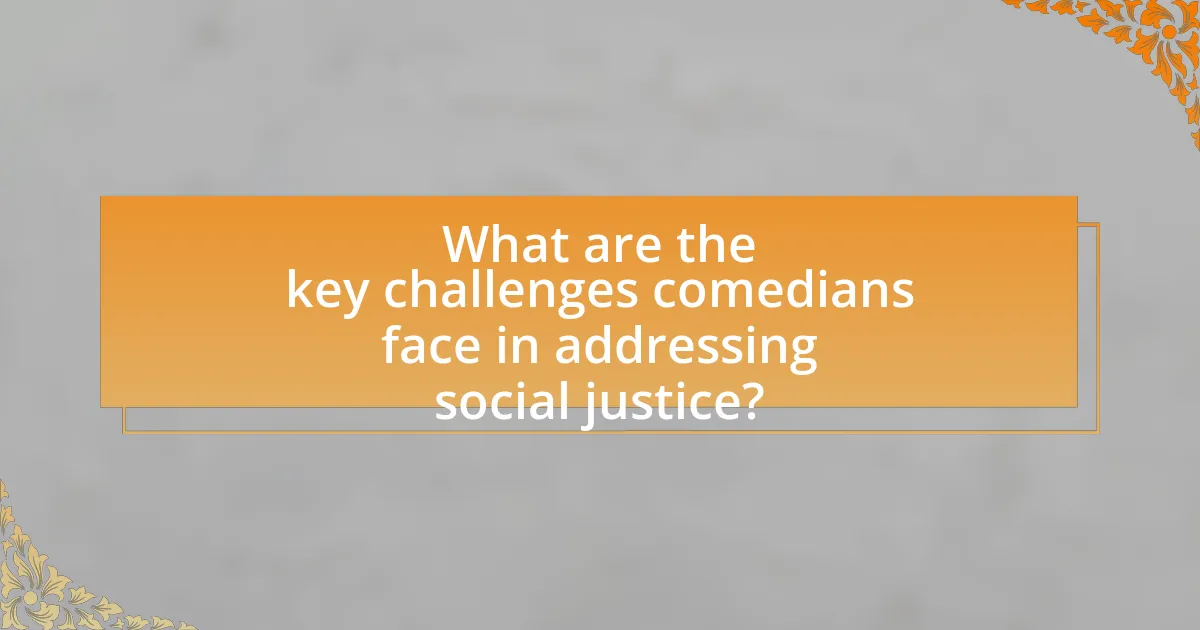
What are the key challenges comedians face in addressing social justice?
Comedians face several key challenges in addressing social justice, primarily including audience backlash, the risk of misinterpretation, and the fine line between humor and offense. Audience backlash occurs when jokes about sensitive topics provoke strong negative reactions, potentially alienating fans or leading to public outrage. The risk of misinterpretation arises when comedic intent is misunderstood, resulting in unintended offense or harm to marginalized communities. Additionally, comedians must navigate the delicate balance between using humor to highlight social issues and avoiding reinforcement of stereotypes or perpetuating discrimination, which can undermine the very social justice they aim to support. These challenges are compounded by the current climate of heightened sensitivity around social issues, making it increasingly difficult for comedians to engage in meaningful discourse through their art.
How do audience perceptions influence comedic content on social justice?
Audience perceptions significantly influence comedic content on social justice by shaping the boundaries of acceptable humor and determining the effectiveness of comedic messages. Comedians often tailor their material to resonate with audience values and sensitivities, as humor that challenges social norms can be met with backlash if perceived as offensive or inappropriate. For instance, research indicates that audiences are more receptive to comedy that aligns with their social justice beliefs, leading comedians to adopt a more nuanced approach to topics like race, gender, and inequality. This dynamic is evident in the success of comedians like Hasan Minhaj and John Oliver, who address social issues while considering audience reactions, thereby reinforcing the idea that audience perceptions directly impact the creation and reception of comedic content related to social justice.
What role does cultural sensitivity play in comedy?
Cultural sensitivity plays a crucial role in comedy by ensuring that humor does not perpetuate stereotypes or offend marginalized groups. Comedians who are culturally sensitive can create inclusive content that resonates with diverse audiences, fostering understanding rather than division. For instance, research by the University of Southern California found that humor that acknowledges cultural differences can enhance social cohesion and promote empathy among different cultural groups. This highlights the importance of comedians being aware of their audience’s backgrounds and experiences to avoid reinforcing harmful narratives.
How can comedians navigate backlash from their audiences?
Comedians can navigate backlash from their audiences by actively engaging in open dialogue and adapting their material based on audience feedback. This approach allows comedians to understand the perspectives of their audience, fostering a connection that can mitigate negative reactions. For instance, comedians like Dave Chappelle have faced backlash but have used social media and interviews to clarify their intentions and engage with critics, demonstrating the effectiveness of communication in addressing concerns. Additionally, comedians can refine their content to be more inclusive and sensitive to social issues, which has been shown to resonate better with diverse audiences, as evidenced by the success of comedians who prioritize social awareness in their routines.
What strategies can comedians use to effectively address social justice issues?
Comedians can effectively address social justice issues by using satire, storytelling, and audience engagement. Satire allows comedians to critique societal norms and injustices in a humorous way, making difficult topics more accessible. For example, comedians like John Oliver and Hasan Minhaj use satire to highlight issues such as systemic racism and political corruption, prompting audiences to reflect on these matters.
Storytelling enables comedians to share personal experiences related to social justice, fostering empathy and understanding. For instance, Tiffany Haddish often incorporates her background and struggles into her routines, which resonates with audiences and raises awareness about issues like poverty and inequality.
Engaging the audience through interactive performances or social media can also amplify the message. Comedians like Hannah Gadsby have successfully used platforms like Netflix to reach wider audiences, sparking conversations about gender and sexuality. These strategies not only entertain but also educate, making comedy a powerful tool for social change.
How can humor be used to foster understanding and empathy?
Humor can be used to foster understanding and empathy by breaking down barriers and facilitating open communication between diverse groups. When humor addresses sensitive topics, it can create a safe space for individuals to engage with difficult issues, allowing them to explore different perspectives without the weight of confrontation. Research indicates that humor can enhance social bonding and reduce anxiety, making it easier for people to connect emotionally. For example, a study published in the journal “Personality and Social Psychology Bulletin” found that shared laughter can increase feelings of closeness and trust among individuals, thereby promoting empathy. By using humor thoughtfully, comedians and individuals can highlight social injustices and encourage audiences to reflect on their own beliefs and biases, ultimately fostering a deeper understanding of others’ experiences.
What are some examples of successful comedic approaches to social justice?
Successful comedic approaches to social justice include shows like “The Daily Show,” which uses satire to critique political issues and social injustices, and “Saturday Night Live,” which often highlights racial and gender inequalities through sketch comedy. Additionally, comedians like Hasan Minhaj in “Patriot Act” address systemic racism and immigration issues with humor, while Dave Chappelle’s specials tackle topics like police brutality and LGBTQ+ rights, sparking conversations around these critical issues. These examples demonstrate how comedy can effectively raise awareness and provoke thought on social justice matters.
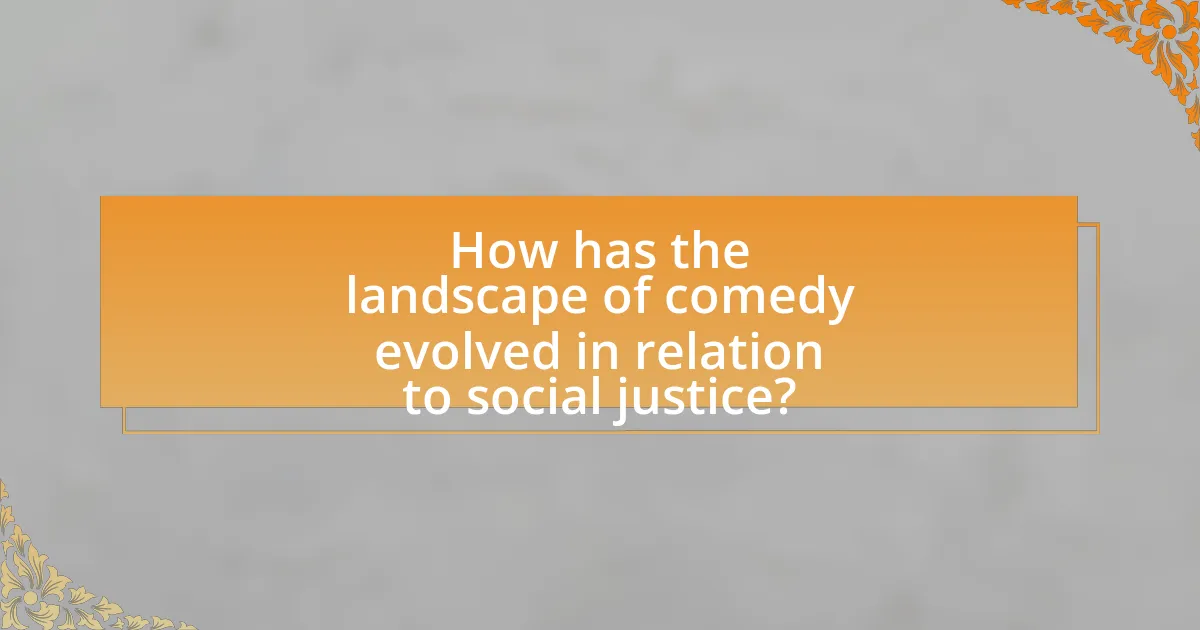
How has the landscape of comedy evolved in relation to social justice?
The landscape of comedy has evolved significantly in relation to social justice by increasingly addressing issues of inequality, discrimination, and systemic oppression. Historically, comedians like Richard Pryor and George Carlin used humor to challenge societal norms and provoke thought on social issues, paving the way for contemporary comedians who tackle topics such as race, gender, and LGBTQ+ rights. For instance, shows like “The Daily Show” and “Saturday Night Live” have incorporated social justice themes into their satire, reflecting public discourse and raising awareness. This shift is evidenced by the rise of comedians like Hannah Gadsby, whose special “Nanette” critiques the comedy industry’s treatment of marginalized voices, highlighting the importance of representation and accountability in comedy.
What impact has social media had on comedy and social justice?
Social media has significantly transformed comedy and social justice by amplifying voices and facilitating rapid dissemination of content. Comedians now use platforms like Twitter and Instagram to address social issues, often leading to increased awareness and dialogue around topics such as racism, sexism, and inequality. For instance, the viral success of comedians like Hannah Gadsby, who addresses personal and societal injustices in her work, demonstrates how social media can elevate discussions on social justice through humor. Additionally, social media allows marginalized voices to share their experiences and perspectives, fostering a more inclusive comedic landscape that challenges traditional norms and promotes social change.
How do online platforms change the way comedians engage with social issues?
Online platforms significantly alter how comedians engage with social issues by providing immediate access to a global audience and facilitating real-time feedback. This shift allows comedians to address social issues more dynamically, adapting their material based on audience reactions and current events. For instance, platforms like Twitter and Instagram enable comedians to share short, impactful messages or videos that can quickly go viral, amplifying their commentary on social justice topics. Additionally, the democratization of content creation means that diverse voices can emerge, challenging traditional gatekeeping in the comedy industry. Research indicates that comedians who utilize social media can reach wider demographics, enhancing their ability to influence public discourse on social issues.
What are the implications of viral content for social justice in comedy?
Viral content in comedy significantly impacts social justice by amplifying marginalized voices and challenging societal norms. This amplification occurs as comedic material that resonates widely can bring attention to social issues, fostering dialogue and awareness. For instance, comedians like Hannah Gadsby have utilized viral platforms to address topics such as gender identity and mental health, leading to increased visibility and discussions around these subjects. Furthermore, viral comedy can mobilize audiences, as seen with social media campaigns that leverage humor to advocate for social change, thereby influencing public opinion and policy. The rapid dissemination of such content can also lead to backlash against oppressive systems, demonstrating the potential of comedy as a tool for social justice.
What role do diverse voices play in the intersection of comedy and social justice?
Diverse voices play a crucial role in the intersection of comedy and social justice by providing unique perspectives that challenge societal norms and highlight marginalized experiences. These voices contribute to a richer comedic landscape, allowing for humor that addresses systemic issues such as racism, sexism, and inequality. For instance, comedians like Hasan Minhaj and Tiffany Haddish use their cultural backgrounds to infuse their routines with insights that resonate with underrepresented communities, fostering understanding and empathy among broader audiences. Research indicates that comedy can serve as a powerful tool for social change, as it encourages dialogue and reflection on important social issues, making diverse voices essential in this dynamic.
How can representation in comedy influence social justice narratives?
Representation in comedy can significantly influence social justice narratives by providing visibility to marginalized voices and challenging societal norms. When comedians from diverse backgrounds share their experiences, they can highlight issues of inequality, discrimination, and injustice, fostering empathy and understanding among audiences. For instance, shows like “Insecure” and “Master of None” have addressed topics such as race, gender, and sexuality, prompting discussions about these social issues. Research indicates that humor can serve as a tool for social change by making difficult subjects more approachable, thus encouraging audiences to reflect on their own biases and assumptions. This interplay between comedy and social justice not only entertains but also educates, ultimately contributing to a broader cultural dialogue around equity and inclusion.
What challenges do underrepresented comedians face in this space?
Underrepresented comedians face significant challenges, including limited access to platforms, stereotypes, and systemic biases within the comedy industry. These comedians often struggle to secure gigs in mainstream venues, as industry gatekeepers may favor established, predominantly white male comedians, leading to fewer opportunities for diverse voices. Additionally, underrepresented comedians frequently encounter stereotypes that can limit their comedic range and pigeonhole their material, forcing them to navigate expectations that do not reflect their authentic experiences. Research indicates that only 12% of stand-up comedians in the U.S. identify as people of color, highlighting the disparity in representation and the barriers that persist in the industry.
What practical tips can comedians follow to balance humor and social justice?
Comedians can balance humor and social justice by employing sensitivity, research, and audience awareness. Sensitivity involves understanding the impact of jokes on marginalized communities, ensuring that humor does not perpetuate stereotypes or harm. Research is crucial; comedians should educate themselves on social issues to create informed material that resonates authentically with their audience. Audience awareness means tailoring content to the specific demographic present, allowing for humor that is both relatable and respectful. For instance, comedians like Hasan Minhaj and John Oliver successfully address social justice topics while maintaining humor by grounding their jokes in factual context and personal experiences, demonstrating that comedy can be both entertaining and enlightening.
How can comedians ensure their material is both funny and respectful?
Comedians can ensure their material is both funny and respectful by focusing on universal themes and avoiding stereotypes that target marginalized groups. By crafting jokes that resonate with shared human experiences, comedians can create humor that is inclusive rather than divisive. Research indicates that humor that promotes empathy and understanding, rather than ridicule, tends to be more well-received and fosters a positive atmosphere. For instance, a study published in the Journal of Communication found that humor that emphasizes commonalities among people can enhance social cohesion and reduce prejudice. Therefore, comedians should prioritize content that uplifts rather than alienates, ensuring their comedy is both entertaining and considerate.
What resources are available for comedians looking to engage with social justice themes?
Comedians looking to engage with social justice themes can access various resources, including workshops, online courses, and organizations dedicated to social justice in comedy. For instance, organizations like the Comedy Coalition provide training and support for comedians to address social issues through their work. Additionally, platforms such as The Second City offer classes focused on using comedy as a tool for social change. Research indicates that comedians who participate in these programs often develop a deeper understanding of social justice issues, enhancing their ability to address them effectively in their performances.
